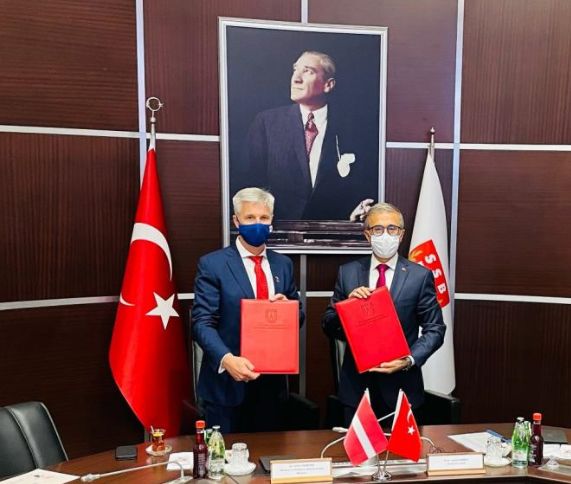The diplomatically tricky background of MoD Pabriks' visit to Turkey
Minister of Defense Artis Pabriks uses the easing of pandemic restrictions to visit the allies. He is in Italy this week, but had previously visited Turkey, and this was a rather difficult visit from a diplomatic point of view. The Latvian parliament had just adopted a declaration on the Ottoman Empire's genocide against Armenians, which angered the Turkish government.
It is no coincidence that the Latvian Minister of War was photographed and displayed in the media with the image of the “Father of the Turks,” the founder of modern Turkey, in the background. Turkey is dominated by the cult of Atatürk, but it is unusual to ask a guest to pose against such a background from a protocol standpoint. It would be the same if the Turkish Minister had to take pictures in Latvia with our authoritarian leader Kārlis Ulmanis behind him. Most likely, Dr. Pabriks was thus punished in the place of the Latvian parliament for the political declaration it adopted. The Turks, you see, show kindness to Latvia. They are ready to sell fancy drones, armored vehicles. Until the end of the summer, the sky of the Baltic States will be protected from unwanted visitors by Turkish destroyers F-16. But Latvia, instead of thanking its ally, points to the log in its eye.
Is genocide genocide?
The matter is about the mass murder and forced relocation of Armenians in the Ottoman Empire during the First World War. One and a half million Armenians were killed. Turkey, the heir to the Ottoman Empire, does not recognize this genocide. In its interpretation, both the number of people killed was smaller and the reasons for the destructive warfare were different. Meanwhile, the Armenians themselves and many other countries call it genocide, even though trial under international treaties is no longer possible. As soon as the Armenian genocide was recognized by the United States, Latvia hurried after its strategic partner and did the same. On May 6, the Saeima adopted a declaration in which it:
"condemns the crimes, killings and forced relocations committed by the Ottoman Empire against the Armenian people;
respects the memory of all the victims of the genocide, pays tribute to all the survivors;
is convinced that an open and free debate on historical issues is inextricably linked to building healthy and mature democracies;
calls on the international community to evaluate these historic events and to look to the future that we want to build free from violence and intolerance, a future that respects human rights and in which every individual can feel free, secure and safe."

The Turks condemn the declaration
The only minister who had clear concerns about the declaration was Artis Pabriks. He also shared them publicly on Twitter:
"The position of the US President on the ancient issue of the Armenian genocide will only complicate cooperation between 2 NATO countries when it is most needed. I can give similar advice to those Latvian parliamentarians who want to buy indulgences for themselves by sacrificing national interests.” Pabriks already knew at that time that he would have to go to Turkey in a month and probably listen to various unpleasant remarks. Maybe taking pictures with Atatürk in the background was not the most unpleasant moment of the visit. Who knows, apart from the Latvian delegation. The Turkish government reacted immediately and with very harsh words to the declaration adopted by Latvia. They published a statement, which is still available on the website of the Turkish Ministry of Foreign Affairs. The Latvian declaration is treated as a bad attempt to rewrite history for political reasons:
"We reject and strongly denounce this unfortunate and unlawful declaration. Parliaments are not venues to write or pass judgments on history.
None of the conditions required for the use of the term “genocide” that is strictly defined in international law exist with regards to the events of 1915."
Capabilities will be researched
The Turks were very angry, but in this case, US President Joe Biden served as a major lightning conductor, and the planned visit of the Latvian Minister of Defense not only took place but, as can be understood, also culminated in some success. An economic co-operation agreement has been signed, which envisages the establishment of co-operation between the Latvian military industry and the Turkish industry. The Turks are already rubbing their hands about the upcoming agreements. Minister Pabriks told the military portal Sargs that:
"The Latvian Armed Forces must promote what is related to the reduction of asymmetry and the development of combat capabilities. This is related to the introduction of various drone systems - unmanned aerial vehicles, unmanned ships and unmanned armored vehicles. We are very interested in these things. One of the next steps would be joint research and negotiations at the technical level with the Turkish side to understand how we can jointly develop the R&D capabilities of the two countries' defense industries."
It should be recalled that such joint capacity research is also taking place with Finland, and the intended result of the study will be six-wheel armored vehicles, which we might otherwise fail to buy in a normal tender. In Turkey, too, Minister Pabriks has started research - he has visited both the Baykar Makina drone factory and the Otokar military engineering company. Of course, with the immortal "Father of the Turks" Mustafa Kemal Atatürk in the background.